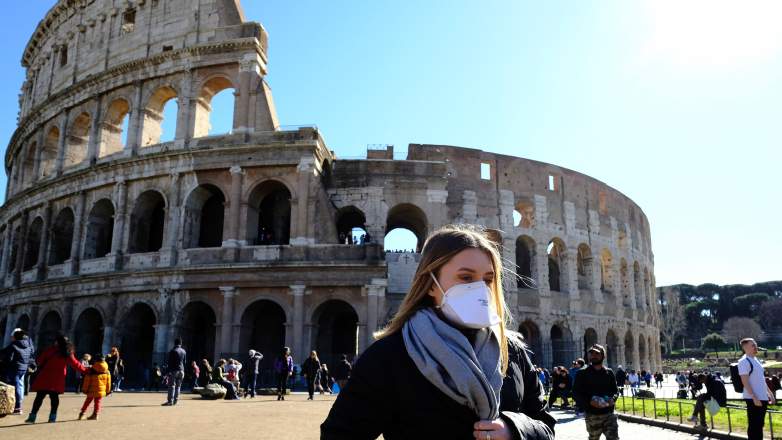
Authorities in Malaysia actually had to dispel the fear some people have that coronavirus causes zombie like symptoms. This false rumor may derive from the popularity of virus outbreak zombie shows like The Walking Dead.
In this case, though, you don’t have to worry about “walkers” roaming around your community (thank goodness), and Rick Grimes isn’t going to lead us to safety (unfortunately). The coronavirus (COVID-19) doesn’t present symptoms anything like that. In fact, they’re a lot like the flu. No, it’s not a zombie apocalypse.
“The claim that individuals infected with this virus will behave like zombies is not true. … Patients can recover,” Malaysia’s health minister wrote on Twitter. According to Japan Times, police in that country actually arrested several people after accusing them of “spreading misinformation” about coronavirus, and the notion that it might turn people into zombies has gained some traction on social media.
Here’s what you need to know:
The Hospital Where Rick Grimes Woke Up Has a Former Patient With Coronavirus

Andrew Lincoln as Rick Grimes – The Walking Dead _ Season 7, Episode 12 – Photo Credit: Gene Page/AMC
In one eerie twist, coronavirus did hit a former patient from the hospital that Rick Grimes woke up inside in The Walking Dead, to discover his world had disintegrated into a zombie apocalypse.
According to Metro UK, in the comic books that the show is based on, Rick Grimes woke up in Kentucky’s Harrison Memorial Hospital.
That hospital issued a statement revealing that a patient has coronavirus. It reads, “On 6 March, 2020, HMH was contacted by the Kentucky Department of Public Health (KDPH) regarding a confirmed COVID-19 case who had been a previous patient at Harrison Memorial Hospital (HMH) in Cynthiana, Kentucky.”
Coronavirus Symptoms Don’t Cause Zombie Like Behavior

GettyTourist wearing a protective respiratory mask tours outside the Colosseo monument (Colisee, Coliseum) in downtown Rome on February 28, 2020 amid fear of Covid-19 epidemic.
Coronavirus fears are flooding the world as more than 100,000 have been infected.
The symptoms are very similar between coronavirus and the flu, although it’s easier to tease out the differences between coronavirus and a common cold or seasonal allergies. However, there are some key things you should watch for with coronavirus, such as a fever and shortness of breath.
How do you know if you have COVID-19 or the regular flu? Harvard Medical School advises: “COVID-19 often causes symptoms similar to those a person with a bad cold or the flu would experience. And like the flu, the symptoms can progress and become life-threatening. Your doctor is more likely to suspect coronavirus if: you have respiratory symptoms and you recently traveled to countries with ongoing community spread of the COVID-19 virus, including China, Iran, Italy, Japan, South Korea, or you have been exposed to someone suspected of having COVID-19, or there has been community spread of the virus that causes COVID-19 in your area.” In other words, context matters in diagnosis too.
The World Health Organization has calculated that 3.4% of the people worldwide with coronavirus have died. However, calculating death and mortality rates can be tricky business. That grew from an initial estimate of 2 percent.
WHO Director-General Dr Tedros Adhanom Ghebreyesus stated: “Globally, about 3.4% of reported COVID-19 cases have died. By comparison, seasonal flu generally kills far fewer than 1% of those infected.” In The Walking Dead, of course, if you get bit by a zombie you become one.
USA Today reports that, in the United States, flu has led to 12,000 to 61,000 deaths annually since 2010. So far this flu season, “there have been at least 34 million flu illnesses, 350,000 hospitalizations and 20,000 deaths from flu. At least 136 of those deaths were in children,” according to USA Today.
According to Centers for Disease Control and Prevention, coronavirus and the flu share commonalities. “COVID-19 symptoms are similar to those of influenza (e.g., fever, cough, and shortness of breath), and the current outbreak is occurring during a time of year when respiratory illnesses from influenza and other viruses, including other coronaviruses that cause the ‘common cold,’ are highly prevalent,” the site reports.
CNN reports the following:
If you have itchy eyes or a runny nose, you probably have seasonal allergies or just a common cold. That’s because those common ailments are generally confined to the head and nasal areas.
In contrast, according to CNN, coronavirus and flu symptoms tend to affect the whole body. CNN says coronavirus and the flu are less likely to be associated with a runny nose because they “affect other systems and the lower respiratory tract,” although symptoms can include “a sore throat, a cough, a fever or shortness of breath.”
Shortness of breath and a fever are a good way to tell that it isn’t just seasonal allergies or a common cold. Furthermore, you’ll probably end up in bed with coronavirus or the flu, and it will be more obvious that you are sick.
The shortness of breath symptom is a really good indicator of coronavirus, but some people with the flu also get pneumonia, so that can be tricky to decipher. At the earliest stages, the symptoms for all three can seem similar and even mild, according to CNN.
Experts don’t just look at symptoms; they also look at the context around your symptoms, according to CNN. This can include whether you’ve traveled, been exposed to someone with coronavirus, been on a cruise ship, or associated with someone who’s done those things or been in an area with a coronavirus outbreak.
How do you tell the difference between the flu and a cold? “Flu and the common cold are both respiratory illnesses but they are caused by different viruses,” the CDC reports. “Because these two types of illnesses have similar symptoms, it can be difficult to tell the difference between them based on symptoms alone. In general, flu is worse than the common cold, and symptoms are more intense. Colds are usually milder than flu. People with colds are more likely to have a runny or stuffy nose. Colds generally do not result in serious health problems, such as pneumonia, bacterial infections, or hospitalizations. Flu can have very serious associated complications.”
The Centers for Disease Control and Prevention indicates this additional information about coronavirus symptoms:
The following symptoms may appear 2-14 days after exposure.
Fever
Cough
Shortness of breath
Emergency warning signs include:
Difficulty breathing or shortness of breath
Persistent pain or pressure in the chest
New confusion or inability to arouse
Bluish lips or face
Harvard Medical School notes of coronavirus, “Some people infected with the virus have no symptoms. When the virus does cause symptoms, common ones include low-grade fever, body aches, coughing, nasal congestion, runny nose, and sore throat. However, COVID-19 can occasionally cause more severe symptoms like high fever, severe cough, and shortness of breath, which often indicates pneumonia.”
READ NEXT: Coronavirus in Italy.